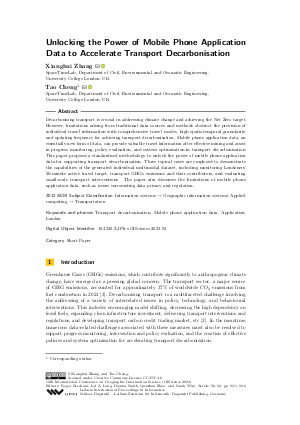Unlocking the Power of Mobile Phone Application Data to Accelerate Transport Decarbonisation (Short Paper)
Authors
Xianghui Zhang  ,
Tao Cheng
,
Tao Cheng 
-
Part of:
Volume:
12th International Conference on Geographic Information Science (GIScience 2023)
Part of: Series: Leibniz International Proceedings in Informatics (LIPIcs)
Part of: Conference: International Conference on Geographic Information Science (GIScience) - License:
 Creative Commons Attribution 4.0 International license
Creative Commons Attribution 4.0 International license
- Publication Date: 2023-09-07
File

PDF
LIPIcs.GIScience.2023.92.pdf
- Filesize: 1.7 MB
- 6 pages
Document Identifiers
Subject Classification
ACM Subject Classification
- Information systems → Geographic information systems
- Applied computing → Transportation
Keywords
- Transport decarbonisation
- Mobile phone application data
- Application
- London
Metrics
- Access Statistics
-
Total Accesses (updated on a weekly basis)
0Document
0Metadata
Abstract
Decarbonising transport is crucial in addressing climate change and achieving the Net Zero target. However, limitations arising from traditional data sources and methods obstruct the provision of individual travel information with comprehensive travel modes, high spatiotemporal granularity and updating frequency for achieving transport decarbonisation. Mobile phone application data, an essentially new form of data, can provide valuable travel information after effective mining and assist in progress monitoring, policy evaluation, and system optimisation in transport decarbonisation. This paper proposes a standardised methodology to unlock the power of mobile phone application data for supporting transport decarbonisation. Three typical cases are employed to demonstrate the capabilities of the generated individual multimodal dataset, including monitoring Londoners’ 20-minute active travel target, transport GHGs emissions and their contributors, and evaluating small-scale transport interventions. The paper also discusses the limitations of mobile phone application data, such as issues surrounding data privacy and regulation.
Cite As Get BibTex
Xianghui Zhang and Tao Cheng. Unlocking the Power of Mobile Phone Application Data to Accelerate Transport Decarbonisation (Short Paper). In 12th International Conference on Geographic Information Science (GIScience 2023). Leibniz International Proceedings in Informatics (LIPIcs), Volume 277, pp. 92:1-92:6, Schloss Dagstuhl – Leibniz-Zentrum für Informatik (2023)
https://doi.org/10.4230/LIPIcs.GIScience.2023.92
BibTex
@InProceedings{zhang_et_al:LIPIcs.GIScience.2023.92,
author = {Zhang, Xianghui and Cheng, Tao},
title = {{Unlocking the Power of Mobile Phone Application Data to Accelerate Transport Decarbonisation}},
booktitle = {12th International Conference on Geographic Information Science (GIScience 2023)},
pages = {92:1--92:6},
series = {Leibniz International Proceedings in Informatics (LIPIcs)},
ISBN = {978-3-95977-288-4},
ISSN = {1868-8969},
year = {2023},
volume = {277},
editor = {Beecham, Roger and Long, Jed A. and Smith, Dianna and Zhao, Qunshan and Wise, Sarah},
publisher = {Schloss Dagstuhl -- Leibniz-Zentrum f{\"u}r Informatik},
address = {Dagstuhl, Germany},
URL = {https://drops.dagstuhl.de/entities/document/10.4230/LIPIcs.GIScience.2023.92},
URN = {urn:nbn:de:0030-drops-189873},
doi = {10.4230/LIPIcs.GIScience.2023.92},
annote = {Keywords: Transport decarbonisation, Mobile phone application data, Application, London}
}
Author Details
- SpaceTimeLab, Department of Civil, Environmental and Geomatic Engineering, University College London, UK
References
- Adel Bolbol, Tao Cheng, Ioannis Tsapakis, and James Haworth. Inferring hybrid transportation modes from sparse GPS data using a moving window SVM classification. Computers, Environment and Urban Systems, 36(6):526-537, 2012. URL: https://doi.org/10.1016/j.compenvurbsys.2012.06.001.
-
Department for Transport. Decarbonising Transport - A Better, Greener Britain. Technical report, United Kingdom Government, 2021.

-
IEA. Transport, IEA. Technical report, International Energy Agency, 2022.

- Peilin Li, Pengjun Zhao, and Christian Brand. Future energy use and CO2 emissions of urban passenger transport in China: A travel behavior and urban form based approach. Applied Energy, 211(October 2017):820-842, 2018. URL: https://doi.org/10.1016/j.apenergy.2017.11.022.
- Xianghui Zhang and Tao Cheng. The impacts of the COVID-19 pandemic on multimodal human mobility in London: A perspective of decarbonizing transport. Geo-spatial Information Science, 00(00):1-13, 2022. URL: https://doi.org/10.1080/10095020.2022.2122876.
